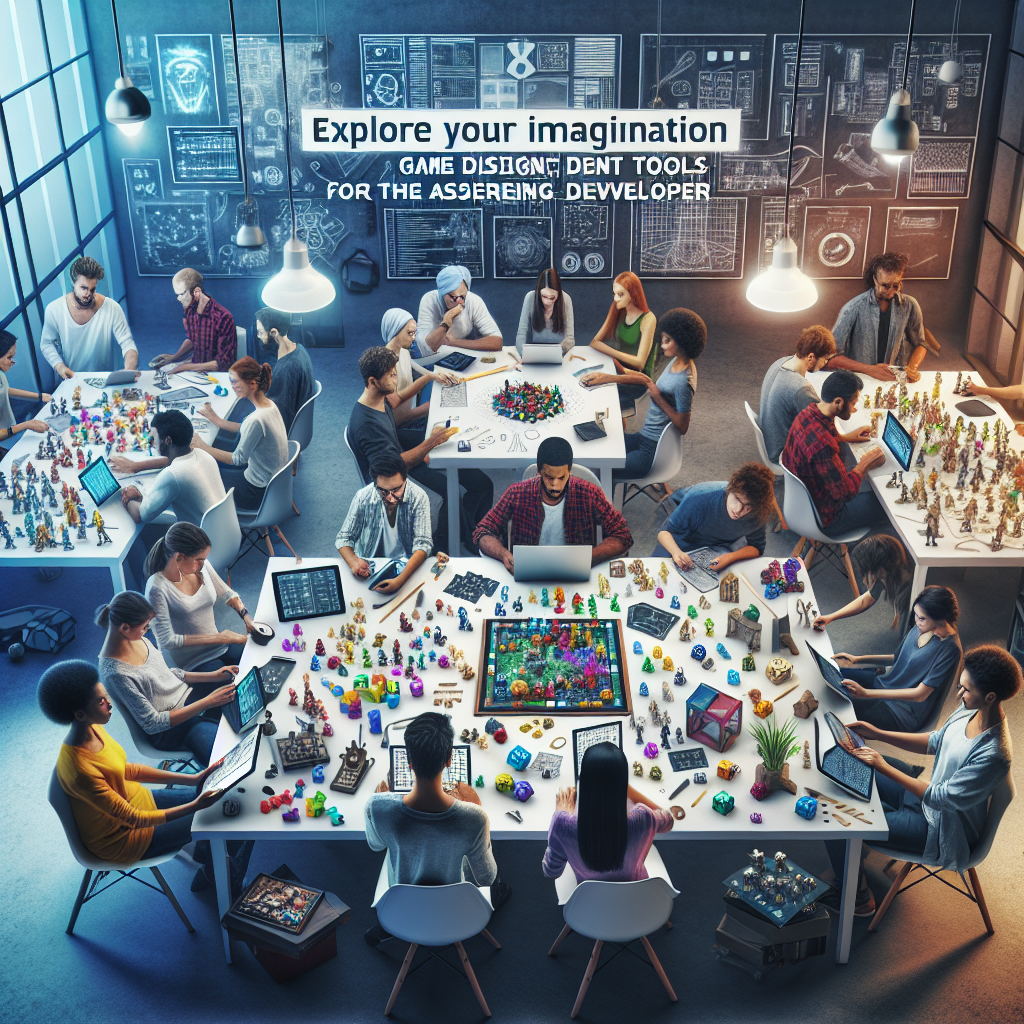Explore Your Imagination: Game Design Tools for the Aspiring Developer
As the world of technology evolves, so does the universe of creative expression. With the rise of indie games and the increasing accessibility of game design tools, aspiring developers are no longer confined to the realms of imagination; they now have the means to bring their visions to life. Whether you dream of creating an engaging platformer, an immersive RPG, or a narrative-driven adventure, a plethora of game design tools can help you turn your ideas into playable realities. This article highlights some of the best tools available for promising developers eager to explore their imaginations and embark on their game development journey.
1. Unity
Unity is one of the most popular game engines in the industry, beloved for its versatility and user-friendly interface. It supports both 2D and 3D game development, making it an excellent choice for newcomers and seasoned developers alike. With a robust asset store and an extensive library of tutorials, Unity empowers aspiring developers to learn at their own pace. Whether you’re looking to create a simple mobile game or a complex PC title, Unity provides the tools necessary to build interactive experiences, implement physics, and optimize performance.
2. Unreal Engine
For those seeking stunning graphics and high-fidelity experiences, Unreal Engine is the go-to solution. Developed by Epic Games, Unreal Engine is renowned for its graphical prowess, making it a favorite among AAA developers. However, it also offers a fantastic opportunity for indie developers, especially through its Blueprints visual scripting system, which allows users to create gameplay mechanics without extensive coding knowledge. The vast array of templates and resources provided by the Unreal Engine community ensures that aspiring developers have ample support and inspiration.
3. Godot
Godot is an open-source game engine that has garnered a passionate following due to its lightweight design and intuitive scene system. Compared to other engines, Godot is highly flexible and features a built-in scripting language called GDScript, which resembles Python, making it easy to learn for beginners. It supports both 2D and 3D game development and offers a rich set of features, including an animation system and visual scripting tools. Godot’s community provides numerous resources, tutorials, and assets, making it easier for newcomers to ramp up their skills.
4. Construct
For those who prefer a less code-intensive approach, Construct is an excellent browser-based game design platform. It allows users to create 2D games using a visual event system, meaning developers can focus on design and gameplay without worrying about writing complex scripts. Construct provides a wealth of tutorials and templates to help newcomers get started quickly. It’s especially popular for educational purposes, as it allows individuals to grasp foundational game design concepts without an overwhelming coding barrier.
5. RPG Maker
RPG Maker has long been a staple for developers looking to create narrative-driven role-playing games. Its user-friendly interface and built-in features cater specifically to storytelling, making it easy to design maps, manage characters, and script events. For those passionate about storytelling and world-building, RPG Maker offers a great way to bring your ideas to life without requiring in-depth programming knowledge. With an active community and numerous resources available, developers can connect and share their RPG creations.
6. GameMaker Studio 2
GameMaker Studio 2 is another fantastic option for aspiring developers, particularly those interested in 2D game development. It combines both intuitive drag-and-drop functionalities with an advanced coding language, allowing users to choose their preferred method of development as their skills progress. With a rich library of assets and an engaging community, developers can quickly begin creating everything from simple puzzle games to complex platformers.
7. Tiled
To any aspiring level designer, Tiled is an indispensable tool. This versatile tile map editor allows users to create stunning 2D game levels using a simple interface. Tiled can be integrated with various game engines, making it easy to transfer your designs. It’s an ideal choice for those who love building intricate landscapes and environments fully tailored to their creative visions.
Conclusion
The journey from imagination to creation can be exhilarating yet overwhelming. Luckily, a treasure trove of game design tools is available to help guide aspiring developers through the process. Whether you’re interested in detailed graphics, narrative storytelling, or straightforward platform mechanics, there’s a tool that can help you express your unique vision.
As you begin your game development journey, remember that practice is key. Don’t hesitate to experiment, iterate, and learn from your mistakes. The gaming world is vast and ever-evolving, offering endless opportunities for creativity. Embrace the possibilities, explore your imagination, and let the tools you wield guide you toward crafting the next great gaming experience. Your adventure starts now!




